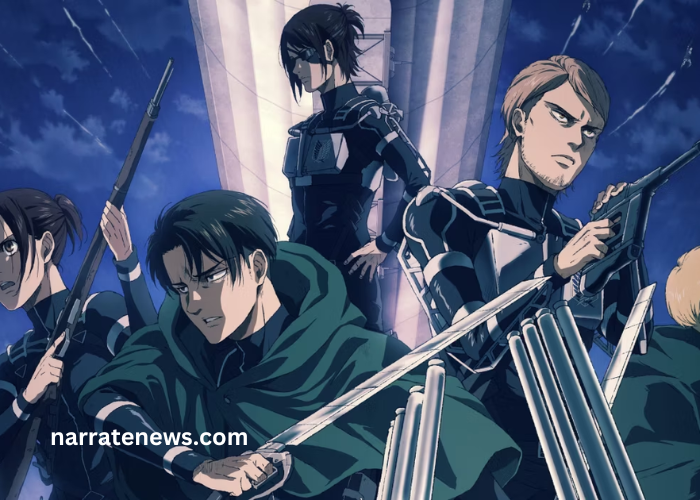
Shingeki No Kyojin Season 4
The fourth and final season of “Shingeki No Kyojin” (Attack on Titan) has been a culmination of the series’ complex narrative and themes, delivering a stunning conclusion to one of the most acclaimed anime and manga series of recent years. Since its debut in 2013, “Attack on Titan” has captured the imaginations of audiences worldwide with its gripping story, intense action sequences, and thought-provoking exploration of human nature, survival, and the consequences of war.
As fans eagerly awaited the final season, expectations were high, given the intricate plotlines and character arcs that had been meticulously developed over the course of the series. With Studio MAPPA taking over the animation duties from Wit Studio for this season, there was both excitement and apprehension about how this iconic story would reach its conclusion.
The Evolution of the Story
“Shingeki No Kyojin” began as a seemingly straightforward tale of humanity’s struggle against monstrous Titans that devoured humans on sight. The early episodes focused on Eren Yeager, Mikasa Ackerman, and Armin Arlert as they witnessed the destruction of their home and joined the military to fight back against the Titans. However, as the story progressed, the narrative expanded dramatically.
Seasons 2 and 3 peeled back layers of mystery surrounding the Titans, revealing political intrigue, deep-seated conspiracies, and the dark truths about the origin of the Titans themselves. Viewers were introduced to the complexities of Marley, the nation that controlled the Titans and viewed Eldians (the people within the walls) as subjugated and dangerous.
Season 4 takes a bold narrative leap, shifting perspectives away from the main characters of Paradise Island to focus on the conflict from the viewpoint of the Marleyan military and Eldian warriors, introducing a new cast of characters and delving deeper into the morally gray nature of warfare. This shift in perspective not only expands the scope of the story but also challenges viewers to reconsider their allegiances and sympathies.
Themes Explored
One of the strengths of “Shingeki No Kyojin” has always been its exploration of complex themes, and Season 4 is no exception. The final season dives headfirst into topics such as xenophobia, propaganda, and the cyclical nature of violence. By depicting the Marleyan-Eldian conflict from multiple angles, the series challenges viewers to confront uncomfortable truths about prejudice and the manipulation of power.
The theme of freedom, a central motif throughout the series, reaches its apex in the final season. Characters grapple with what it means to be free in a world dominated by fear and oppression. Eren Yeager’s character arc, in particular, takes on new dimensions as he becomes increasingly driven by a desire for freedom, leading to morally ambiguous choices that force viewers to question his motives.
Animation and Artistic Direction
Studio MAPPA’s animation style brings a fresh perspective to “Shingeki No Kyojin,” with dynamic action sequences and striking character designs. The fluidity of movement during combat scenes enhances the intensity and brutality of the battles, while quieter moments are imbued with emotional weight through subtle facial expressions and body language.
The shift in artistic direction between seasons, while initially jarring for some viewers, ultimately serves to emphasize the tonal shift of the narrative. The darker color palette and more realistic character designs reflect the increasingly grim nature of the story as it hurtles towards its conclusion.
Character Development
One of the series’ greatest strengths is its nuanced portrayal of characters who grapple with moral dilemmas and personal growth. Season 4 introduces a new roster of characters, each with their own motivations and flaws. Gabi Braun, in particular, emerges as a polarizing figure whose unwavering beliefs and actions force audiences to reconsider their perspectives on heroism and villainy.
Meanwhile, familiar faces from previous seasons undergo significant development. Characters like Reiner Braun and Zeke Yeager, once seen as antagonists, are given depth and complexity through flashbacks that reveal their struggles and motivations. This emphasis on character development adds emotional weight to the narrative, ensuring that the stakes remain high even as the story hurtles towards its climax.
The Fan Response
The final season of “Shingeki No Kyojin” has sparked intense discussions among fans, with debates raging over character motivations, narrative twists, and the thematic implications of the story’s conclusion. Some viewers have praised the series for its willingness to tackle difficult subject matter and subvert expectations, while others have expressed disappointment with certain character arcs and pacing decisions.
Regardless of individual opinions, the final season has undeniably left a lasting impact on the anime community, sparking memes, fan theories, and impassioned analyses of its themes and symbolism. As the series draws to a close, fans eagerly await the ultimate resolution of the conflict and the fate of their favorite characters.
The Legacy of “Shingeki No Kyojin”
“Shingeki No Kyojin” has left an indelible mark on the landscape of anime and manga, redefining the shonen genre with its mature themes and narrative complexity. The series’ legacy extends beyond its captivating story and memorable characters, inspiring countless creators and fans to explore similar themes of survival, identity, and the human condition in their own works.
As the final season concludes, “Shingeki No Kyojin” stands as a testament to the power of storytelling to provoke thought, evoke emotion, and challenge our understanding of the world. Whether the ending is met with celebration or contemplation, one thing is certain: the impact of “Attack on Titan” will continue to resonate long after the final episode has aired.
Conclusion
In conclusion, “Shingeki No Kyojin Season 4” represents the culmination of a journey that has captivated audiences worldwide. With its ambitious storytelling, complex themes, and bold artistic direction, the final season delivers a fitting conclusion to one of the most influential anime series of its generation. As the curtain falls on “Attack on Titan,” fans are left to reflect on the series’ enduring legacy and the profound questions it has raised about humanity, freedom, and the cost of survival.


